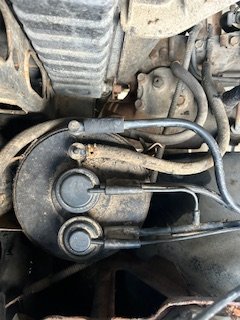73fleetsideABQ
Junior Member
- Joined
- Jul 18, 2020
- Posts
- 7
- Reaction score
- 5
- Location
- Albuquerque
- First Name
- Reed
- Truck Year
- 1973
- Truck Model
- C20
- Engine Size
- 454
Just to note, on the bottom of the purge valve, the large solo outlet indicates "tank" and the other large outlet under the small outlet indicates "CAN". Thus, I wonder if the vapor line should be plugged into this purge valve first not the canister. Vapor line would go to tank inlet on valve, then large outlet to canister (tank input on canister), and small outlet to timed/port vacuum. Then canister purge would go to PCV??? I'm sure I'm over thinking it but I'm just not familiar with how the purge valve actually operates. Thanks for your thoughts.


